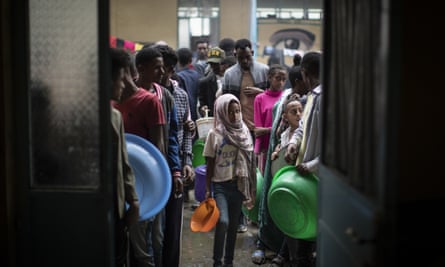The use of rape as a weapon of war is as old as warfare itself. In Bosnia in the 1990s, thousands of Muslim women were brutalised by Bosnian Serb forces, who set up “rape camps” as part of a policy of “ethnic cleansing”. In 2001, the UN’s Yugoslav war crimes tribunal redefined mass rape as a crime against humanity. Yet there have been many similar atrocities since then, including in South Sudan, Syria, Iraq, and Myanmar.
Now the world looks on – or rather, looks away – as it happens again. Today, in Tigray, in northern Ethiopia, large numbers of women and girls are again being subjected to “unimaginable” terror and suffering as a result of pervasive sexual violence. The word “unimaginable” is taken from a disturbing new report on Tigray by Parliament’s international development committee – a report largely ignored by the British government and media.
Reporting from Tigray last week, where fighting erupted in November after government-led forces invaded to topple the region’s breakaway leadership, the International Rescue Committee charity warned the crisis was especially affecting women. “Women are having to engage in sexually exploitative relationships, receiving small amounts of money, food and/or shelter to survive and feed their children,” an IRC spokesman said.
“Rape is being used as a weapon of war across the conflict. Multiple displaced people have given eyewitness accounts of mass rape. Women who are assaulted are in need of multiple levels of care, including emergency contraceptives, and drugs to prevent HIV in addition to psychological support. With 71% of hospital and medical facilities damaged and many looted, medical supplies are scarce,” the IRC said.
Ethiopia’s prime minister, Abiy Ahmed, opened the way for this mass victimisation of women with his disastrous decision to attack. Once feted as a peacemaker, he will be remembered as the man who chose brute force to settle a political argument, in one of the world’s most fragile states, in the middle of a global pandemic.
After failing to secure the quick victory he predicted, Abiy has minimised the scale of the emergency. The latest UN assessment tells a different story: 4.5 million people in need of food and assistance, hundreds of thousands displaced, 67,000 refugees sheltering in Sudan, and humanitarian convoys blocked. Opposition parties say more than 50,000 people have died. Amnesty International last week decried a “ferocious tide” of rights violations including “numerous credible reports of women and girls being subjected to sexual violence, including gang rape, by Ethiopian and Eritrean soldiers”.
Save the Children also sounded the alarm. Thousands of children separated from their families were at daily risk of abuse while living in “unsafe and dire conditions” in informal camps, it said. “Many survivors are too scared to report sexual assault or seek treatment due to stigma and fear of reprisal”.
The worst crimes are often hidden from view, Doctors Without Borders said: “Many of Tigray’s six million people live in mountainous and rural areas where they are all but invisible to the outside world.” Malnutrition was on the rise, especially among children and pregnant women, it said.

The extent of the fighting is unclear, given the government’s internet blackout, reporting restrictions, and unreliable official information. Civilian casualties continue to mount, regional analysts say. Accumulating evidence suggests war crimes and crimes against humanity have been committed by all parties. But Abiy’s army, the Eritrean troops he secretly invited into Tigray, and Amhara militia are believed to be the main culprits.
His initial bullishness dispelled, Abiy now describes the war he began as “tiresome”, says some reports of atrocities are exaggerated or faked, and has promised investigations. He claims Eritrean soldiers are withdrawing. There’s no doubt opposition forces are also much to blame for continuing carnage and misery. But hopes Abiy will heed appeals to stop fighting and open peace talks were dashed last weekend when Ethiopia’s council of ministers formally designated Tigray’s leadership, the Tigray People’s Liberation Front, as a terrorist organisation. The International Crisis Group warns guerrilla warfare could drag on for years.
Anyone expecting decisive international intervention is likely to be disappointed. The African Union has proved ineffective, the UN security council even more so. G7 foreign ministers, meeting in London last week, went out of their way to avoid upsetting Abiy’s government, which they persist in regarding as a strategic ally rather than a problematic actor.
“We condemn the killing of civilians, rape and sexual exploitation, and other forms of gender-based violence,” the G7 communique said. It backed an investigation process, called for a ceasefire and improved humanitarian access, and urged “a clear, inclusive political process in Tigray”.
But direct pressure on Abiy, such as the threat of sanctions and aid cuts, and concerted, collective action to find and prosecute those legally responsible for atrocities and mass rapes were wholly lacking. It was a feeble start for US president Joe Biden’s putative “alliance of democracies” and Boris Johnson’s idea of Britain as a global “force for good”.
Maintaining Ethiopia’s “unity and territorial integrity” appears to be the west’s main concern. Yet under Abiy’s divisive leadership, lethal clashes between the Oromo and Amhara ethnic groups are escalating. Political violence affects several regions. A possible war with Egypt looms over Addis Ababa’s new Blue Nile dam. And on 5 June, ill-prepared, boycotted, and un-monitored national elections that Abiy vows to win could drive Ethiopians further apart.
Under Abiy, Ethiopia – once Africa’s big success story – is at growing risk of fracture and failure. The international community should call him personally to account before it’s too late.
Tigray’s abused, abandoned women cannot do it themselves. Unseen and unheard, they are drowning in a sea of tears.

